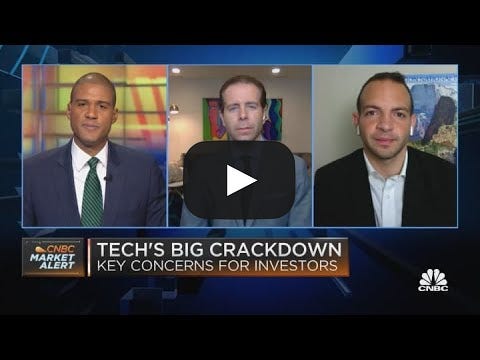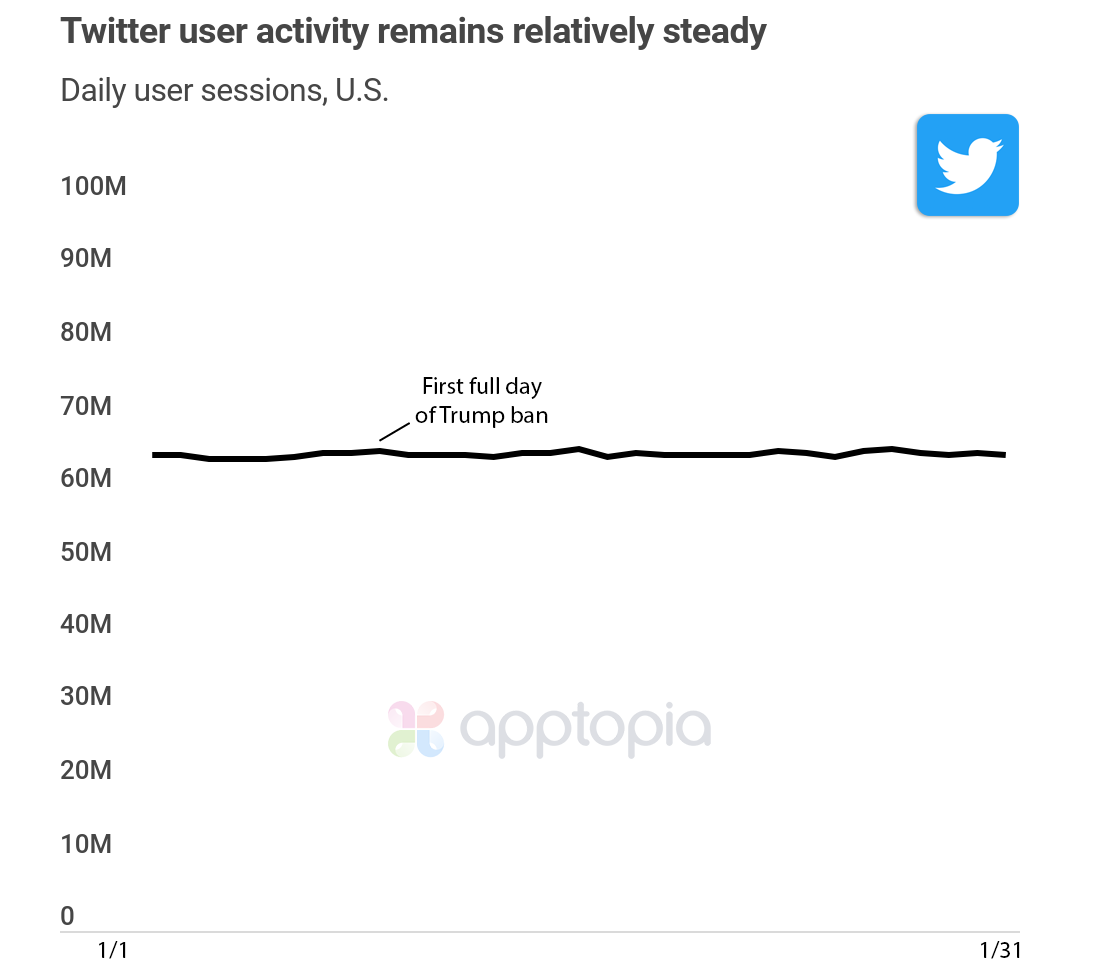Welcome to this week’s edition of Big Technology, where we’ll again use data to debunk a narrative. Next week, we’ll look into Clubhouse’s forthcoming battle with Twitter. First time here? You can subscribe easily with this button:
For as long as Donald Trump was president, there was a common misconception that Twitter’s fate was tied to his. That without his presence, Twitter would lose truckloads of users and engagement, and it was therefore beholden to him. Now that Twitter’s banned Trump though, the data shows he had no discernable impact on how much people used it.
Daily use of Twitter has remained remarkably consistent after it banned Trump last month, according to new data from mobile research company Apptopia. Across January, Twitter barely registered a blip in the number of times people used its app. The day of the ban itself is impossible to pick out when looking at the trend line.
“It is not easy for one person to have a noticeable impact on such large social network apps,” Adam Blacker, Apptopia’s VP of insights and global alliances, told me. “Cultural events are seen much better in the data than any singular person's situation.”
The new data, first published here, can finally put to rest the notion that Twitter kept Trump on its service to boost engagement and make money from ads. Despite Trump’s numerous run-ins with its rules, Twitter kept his account live as a matter of principle.
“Twitter felt an extreme responsibility to allow and stimulate public conversations,” one former Twitter executive told me. “They wrestled with that charge, the ability to enable those conversations, and what Trump had done to turn the conversations — and even the platform — negative.”
Beyond ideological opposition to removing Trump, Twitter’s real risk in banning him was it could spark concern among world leaders that they might be next. These leaders could block Twitter or punish staff in their countries, something the ex-executive said was a real fear. (Indeed, India is now threatening Twitter employees with prison time for letting journalists criticize its government.) For Twitter, this was more worrisome than a potential drop in usage that was never likely to materialize.
Twitter declined to comment. But it didn’t dispute the data. Apptopia pulls data from 125,000 apps on iOS and Android, along with publicly available sources, to reach its conclusions. Its data didn’t show any meaningful change in Twitter downloads, sessions, or time spent after the ban.
Twitter’s business did have a solid four years under Trump. While Twitter CEO Jack Dorsey only narrowly survived an activist investor’s attempt to oust him, the company’s stock price tripled during Trump’s presidency. Twitter’s success however was largely the result it finding direction under Dorsey, who had it focus on news while Facebook pulled back.
With @realDonaldTrump no longer active, Twitter might even enjoy a bump in business, according to Darren Lachtman, a former Twitter global director of brand strategy. “Twitter is and has been a steady part of pop culture, and one user — no matter who he is — disappearing clearly didn’t make a big difference,” he told me. “If anything, this will be a plus for advertisers who were turned off by toxicity from the past few years.”
Further reading (from me at BuzzFeed):
How Twitter Made The Tech World's Most Unlikely Comeback (2018)
Trump Runs Twitter Now, But He's Not Going To "Save" It (2017)
Meet Big Technology’s Headline Sponsor: Mediaocean
It’s been a BIG week for BIG TECH with BIG earnings. Find out how you can net BIG gains with Mediaocean TECH for omnichannel advertising on these platforms and beyond. Visit Mediaocean.com/BIGTECH to learn more.
On CNBC: For Twitter usage, think news cycles, not newsmakers
I joined CNBC last month to discuss the impact of the Trump ban. As I put it then, the key to Twitter usage is news cycles — or “cultural moments,” as Apptopia’s Blacker put it — vs. newsmakers. The exchange starts at 4:00:

What’s happening to the market? Some thoughts from Ranjan Roy of Margins
As the markets went bonkers last week, I included a few links to stories I felt worthwhile. One, by Ranjan Roy of Margins, was so good that I brought him on for an emergency Big Technology Podcast. Here are a few highlights from Roy:
On Zero Interest Rate Policy: “As long as the market goes up, and basically all kind of infrastructure [in] the economy is telling you to put your money into slightly riskier and riskier assets, you will do that. It's how things are designed to be done, and it's how they're actually happening.”
On the market’s rationality, or lack thereof: “Watching what's happened over the last six months to one year has just given such a great reminder — this is even having sat at a trading floor during the depths of the financial crisis, working overnight the morning Lehman went bankrupt — it just gets weirder and crazier and new and novel all the time.”
On adding friction to risky trades: “No one should be allowed to trade on margin or even trade options within a few minutes. That's such a simple thing. And that's the way it actually was before. So there's no reason we shouldn't be able to go back to that. To me, that is not an anti-democratic thing. It's just a reasonable thing. There are so many behavioral things that as a society, we try to put limits on, or try to help people and educate them on, that speculation in the financial market seems like a pretty easy one.”
You can listen to the full podcast on Apple, Spotify, Overcast, or wherever you get your podcasts.
This week on Big Technology Podcast: Glenn Greenwald on Substack, content moderation, and Joe Rogan
In January, I wrote a story for OneZero about the content moderation war in store for smaller social platforms like Clubhouse, Spotify, and Substack. As part of my reporting, I reached out to Glenn Greenwald, a strident voice against moderation who left The Intercept for Substack last year. While I’m not in lockstep with Greenwald ideologically, I wanted to hear, and present, his thoughts at length.
This week’s Big Technology Podcast features my full conversation with Greenwald, where we discuss his move to Substack, the line between content moderation and censorship, and Joe Rogan.
You can check it out on Apple Podcasts, Spotify, and Overcast.
See you next Thursday.
If you liked this post from Big Technology, why not share it?



